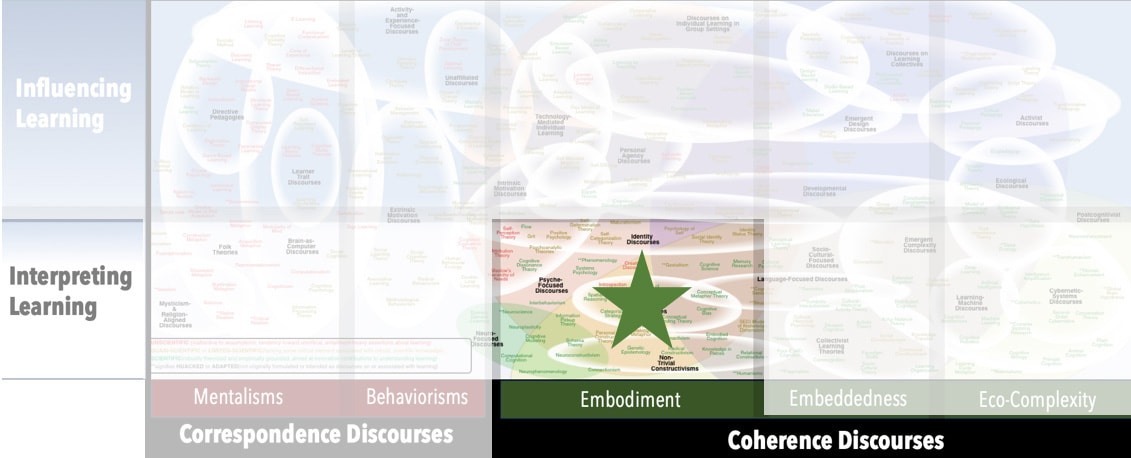AKA
Piagetian Constructivism
Focus
Personal sense-making/understanding/knowingPrincipal Metaphors
- Knowledge is … sum of collectively established construals/constructions
- Knowing is … evolving webs of coherent interpretations; fitness with circumstances
- Learner is … a meaning-maker (individual)
- Learning is … adapting (construing*, connecting, interpreting, weaving)
- Teaching is … occasioning, prompting, triggering, listening
Originated
1960sSynopsis
Genetic Epistemology is Jean Piaget’s theory of the genesis/origin of knowing/epistemology. Critical of efforts to explain cognition in terms of Newtonian mechanics, and greatly influenced by Darwinian evolutionary theory, in Piaget’s Genetic Epistemology ideas are understood to evolve in relationship to and interaction with others in an ecosystem of notions. Learning is thus framed as an adaptive process in which the principal criteria of personal truth are coherence among elements of understanding and their utility for making sense of one’s own experience, not match between internal models and external reality or subjective interpretation and objective fact. To this point, one of Piaget’s major contributions was using the metaphor of “adaptation” (from evolutionary theory) to describe learning. He saw learning-as-adaptation as involving a disruption ...- Disequilibrium (Cognitive Disequilibrium) – a metaphor introduced by Piaget to refer to the experience of unsettledness or inconsistency that triggers the emergence or modification of a schema
- Equilibration (Jean Piaget, 1960s) – Drawing an analogy to notion of “equilibrium” in chemistry, Piaget used the metaphor of Equilibration to describe the motivators of Assimilation and Accommodation – namely, one’s need to calm feelings of being unsettled or disrupted:
- Assimilation – applying prior learnings to new information (e.g., referring to all farm buildings as “houses”), and so learning with no modification to a schema
- Accommodation – revising prior learnings to deal with new information (e.g., upon learning that non-human animals live in barns and wheat is stored in granaries, distinguishing among “farm buildings”), and so significantly modifying a schema
 Other core concepts of Genetic Epistemology include:
Other core concepts of Genetic Epistemology include:
- Interiorization (Jean Piaget, 1960s) – Closely aligned with the notion of Locus of Control (see Personality Psychology), for Piaget, Interiorization was a developmental process by which one gradually becomes less dependent on external, environmental structures and more reliant on one’s construals of the world.
- Reflective Abstraction (Jean Piaget, 1960s) – the process of generating new insight (i.e., elaborating established Schemata) by reflecting on what one already knows, without seeking additional experience or information
- Piagetian Theory (Jean Piaget, mid 20th century) – a phrase used to encompass the totality of Jean Piaget’s substantial theoretical opus – including, among other elements, Genetic Epistemology, Stage Theory of Cognitive Development (included under Cognitive Developmentalisms), and Piaget’s Theory of Moral Development (included under Moral Development Theory).
- Stage Theory of Cognitive Development (Piaget's Model of Cognitive Development) (Jean Piaget and Barbel Inhelder, 1940s) – a model that tracks development from birth to late adolescence through Sensorimotor, Preoperational, Concrete Operational, and Formal Operational periods. (See Cognitive Developmentalisms for more detail.)
- APOS Theory (Mark Asiala, 1990s) – focused on problem-solving and originating within undergraduate mathematics education, the hypothesis that one’s understandings emerge iteratively as mental Actions coalesce into Processes which are encapsulated into Objects upon which one can take new mathematical actions. The resulting concepts and structures of concepts are referred to as Schemata (see Schema Theory).
- Developmental Teaching Model (diffuse authorship, 1970s) – a broad category of teaching approaches that are unified in an emphasis on developmentally appropriate intellectual growth (vs., e.g., memorization – see the contrast between Operative Knowledge and Figurative Knowledge in the Deep vs. Surface Learning entry).
- Piagetian Programs – a phrase used to distinguish teaching methods and classroom structures that are informed by Piaget’s Genetic Epistemology and Piaget's Model of Cognitive Development (see above).
Commentary
Genetic Epistemology is often criticized as either ignoring or being oblivious to situational (i.e., social, cultural, technical, etc.) considerations – accusations that serve as immediate evidence that the critic has not actually read Piaget’s work. In fact, Piaget was highly attentive to such matters, but maintained a clear focus on individual sense-making in his research. Closely related to this unfounded criticism, many commentators contend that Genetic Epistemology is incompatible with Socio-Cultural Theory and other perspectives focused on collective elements of cognition. While discrepancies certainly exist, they are hardly insurmountable – and are perhaps better entertained as indications of the complexity of cognition rather than evidence Piaget was “limited” or “wrong.”Authors and/or Prominent Influences
Jean Piaget; Barbel InhelderStatus as a Theory of Learning
Genetic Epistemology is a theory of learning. In contrast to Behaviorisms and other perspectives that arose in the first half of the 20th century, Genetic Epistemology was among the first theoretical offerings to offer clear and critical commentaries of its own assumptions and metaphors.Status as a Theory of Teaching
Genetic Epistemology is not a theory of teaching. As with its near relative, Radical Constructivism, a core tenet is that it cannot tell teachers what do to, since there is no cause–effect relationship between a teacher’s actions and a learner’s construals. That said, Genetic Epistemology has been the source of a great deal of useful advice. (See Radical Constructivism and Cognitive Developmentalisms.)Status as a Scientific Theory
Genetic Epistemology was among the first theories of learning in which the meaning of “learning” was actually interrogated. Piaget’s bold move into evolutionary notions not only afforded a powerful metaphor for learning, it also revealed the ubiquity of naïve and indefensible metaphors – not just in popular Folk Theories but across Behaviorisms and other efforts to scientize the study of cognition. A substantial evidence base has since been assembled.Subdiscourses:
- Accommodation
- APOS Theory
- Assimilation
- Developmental Teaching Model
- Disequilibrium (Cognitive Disequilibrium)
- Equilibration
- Interiorization
- Stage Theory of Cognitive Development (Piaget’s Model of Cognitive Development)
- Piagetian Program
- Piagetian Theory
- Reflective Abstraction
Map Location

Please cite this article as:
Davis, B., & Francis, K. (2024). “Genetic Epistemology” in Discourses on Learning in Education. https://learningdiscourses.com.
⇦ Back to Map
⇦ Back to List
